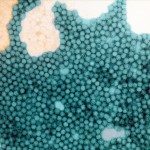Lien vers Pubmed [PMID] – 26983739
Methods Mol. Biol. 2016;1387:251-62
The cloning of large enterovirus RNA sequences is labor-intensive because of the frequent instability in bacteria of plasmidic vectors containing the corresponding cDNAs. In order to circumvent this issue we have developed a PCR-based method that allows the generation of highly modified or chimeric full-length enterovirus genomes. This method relies on fusion PCR which enables the concatenation of several overlapping cDNA amplicons produced separately. A T7 promoter sequence added upstream the fusion PCR products allows its transcription into infectious genomic RNAs directly in transfected cells constitutively expressing the phage T7 RNA polymerase. This method permits the rapid recovery of modified viruses that can be subsequently amplified on adequate cell-lines.

